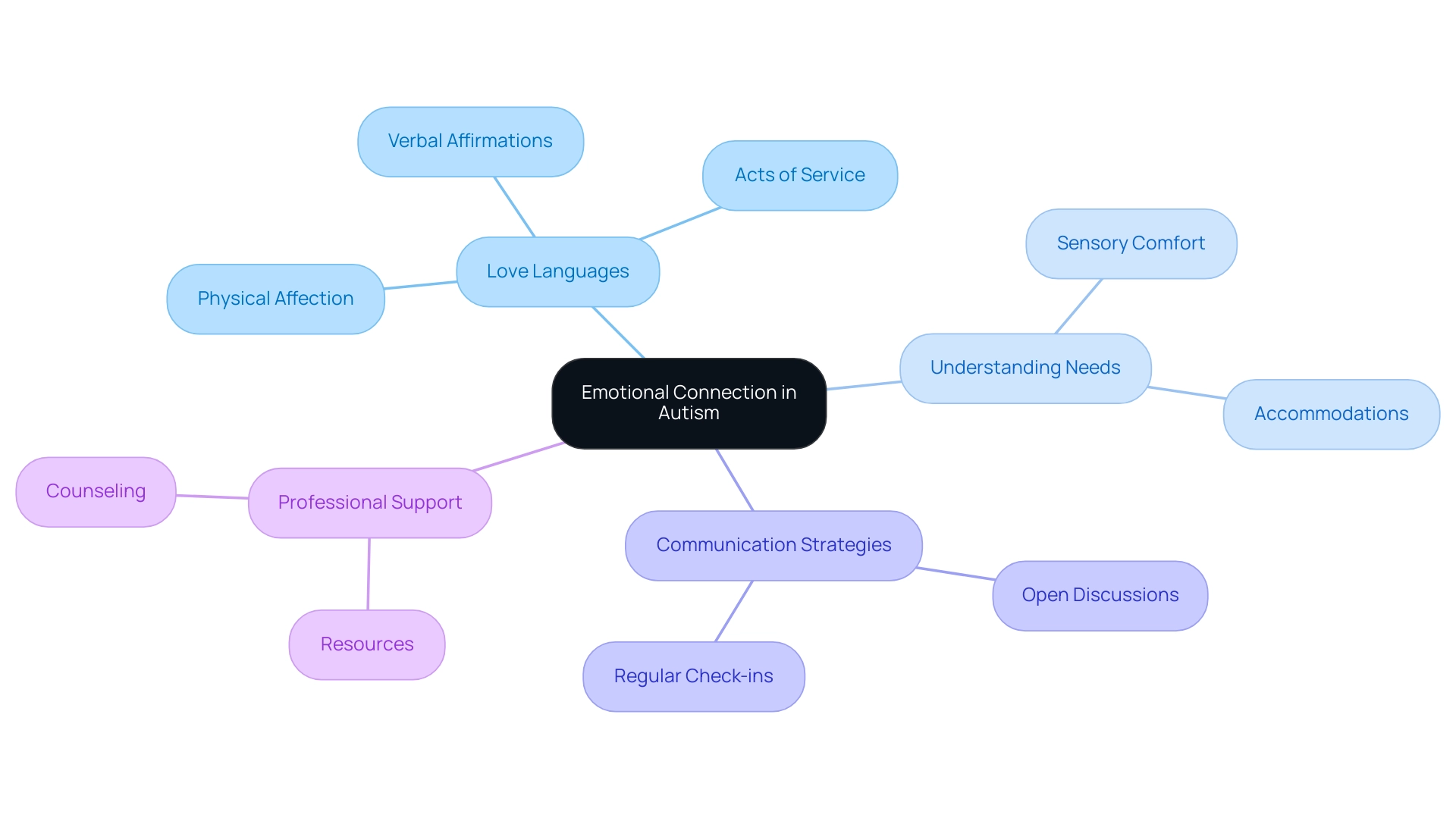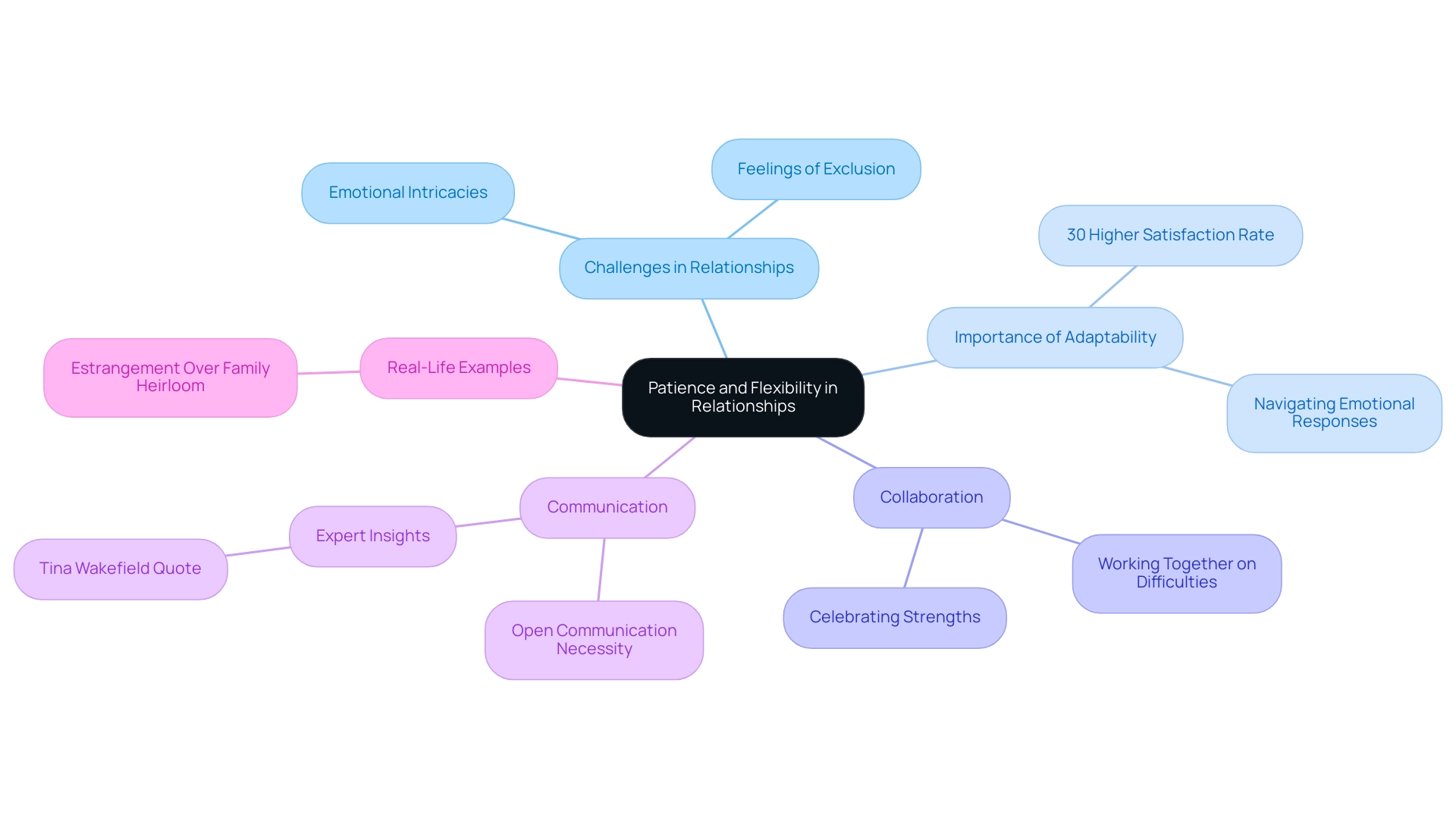Introduction
Building a successful relationship with an autistic partner requires a deep understanding of the unique nuances that come with autism. As individuals on the spectrum experience the world in diverse ways, recognizing traits such as sensory sensitivities and communication styles becomes essential.
This article delves into the intricacies of dating someone with autism, offering valuable insights on:
- Fostering emotional connections
- Navigating challenges
- Enhancing communication
By embracing patience and flexibility, partners can create a nurturing environment that not only strengthens their bond but also empowers both individuals to thrive together. With the right tools and knowledge, navigating the complexities of love in the autism community can lead to fulfilling and enriching relationships.
Understanding Autism: A Foundation for Successful Dating
Autism is inherently a spectrum disorder, impacting people in varied and unique ways. While some may face significant challenges in social communication, others might exhibit average or even above-average intelligence. It is crucial to familiarize yourself with common traits associated with autism, including:
- Difficulties in interpreting social cues
- Heightened sensory sensitivities
- Intense, focused interests
For instance, recent research highlights that approximately 50% of people with high-functioning autism experience clinically significant anxiety, which can further complicate social interactions. Additionally, statistics show that:
- 16% of male students are served for autism under IDEA
- 7% of female students are served for autism under IDEA
This underscores the diverse experiences of individuals on the spectrum. Furthermore, educational outcomes reveal that of the approximately 464,000 students ages 14–21 served under IDEA:
- 74% graduated with a regular high school diploma
- 15% dropped out
Understanding these nuances not only enhances your appreciation of your significant other's perspective when dating an autistic person, but also empowers you to respond to their needs with compassion and effectiveness. By embracing this knowledge, you can cultivate stronger, more supportive connections that are particularly important when dating an autistic person, thriving on mutual understanding.
The Importance of Open Communication in Relationships
Establishing a communication style that resonates with both partners is fundamental for nurturing a healthy bond, particularly when dating an autistic person. Effective communication plays a pivotal role in partnership satisfaction, as highlighted by various studies, including those by Goel ve Narang (2012) and Under (2003), which have consistently shown that effective communication skills significantly predict marital satisfaction. For instance, the Marriage Satisfaction Scale and Effective Communication Skills Scale used in these studies provide insight into how communication impacts relationship dynamics.
To foster open dialogue, be direct and clear in your conversations, steering clear of vague language that can lead to misunderstandings. Actively encourage your significant other to express their needs and feelings, which not only validates their experience but also enhances emotional connection. Regular check-ins are an invaluable practice; they ensure that both partners feel heard and understood, allowing any concerns to be addressed proactively.
As Will Rosenbaum wisely observes, 'the basis of any solid connection lies in effective communication,' making it essential to adopt strategies that promote openness and clarity. By adopting these methods, couples can create a more resilient partnership, especially important when dating an autistic person, thereby improving both their bond and their capacity to handle the unique challenges they may encounter together.
Navigating Challenges: Tips for Dating an Autistic Partner
Navigating relationships with awareness of sensory sensitivities is crucial for fostering connection and support. Statistics show that approximately 70% of autistic individuals experience sensory sensitivities, which can make environments that are excessively bright, noisy, or chaotic particularly challenging. Such settings often lead to feelings of overwhelm.
To create a successful dating experience while dating an autistic person, opt for quieter, more controlled environments that prioritize comfort and relaxation. This thoughtful consideration can be the key to a positive interaction. Additionally, it's essential to practice patience during emotional outbursts or moments of anxiety.
Recognizing that these reactions are often linked to environmental stressors rather than personal issues can help build empathy and understanding. When dating an autistic person, support your partner by offering reassurance and collaboratively developing coping strategies tailored to both of your needs. As Dana's experience demonstrates, navigating such complexities is not merely about managing specific sensitivities but also about ensuring a supportive environment for your children and the connection itself.
Renowned therapist Dr. Jane Smith emphasizes, 'Creating a comfortable space is vital for emotional safety in relationships, including when dating an autistic person.' Furthermore, Robert's reflections on his potential autism diagnosis highlight the broader challenges faced in family dynamics, underscoring the importance of awareness and support. With expert insights emphasizing the significance of sensory sensitivities, your commitment to creating a comfortable atmosphere while dating an autistic person can lead to deeper emotional connections and a more fulfilling partnership.
Emotional Connection: Understanding Love and Affection in Autism
When dating an autistic person, it's important to recognize that they often convey love in ways that differ significantly from neurotypical expressions. For some, physical affection may be more meaningful when shared in specific contexts, while others might demonstrate their care through acts of service rather than relying on verbal affirmations. Providing sensory comfort and accommodations can be a powerful expression of love for those on the autism spectrum.
It’s essential for couples, especially when dating an autistic person, to dedicate time to uncovering each other's distinct love languages, as this shared awareness promotes deeper emotional closeness and strengthens their bond. Open discussions about needs and preferences regarding affection can pave the way for a more fulfilling connection when dating an autistic person. Furthermore, addressing challenges such as misunderstandings requires regular check-ins and developing a shared vocabulary, as highlighted in the case study 'Challenges and Solutions in Navigating Autistic Love Languages.'
Creating a common language of affection and comprehension is a joint effort that demands commitment from both individuals, ultimately improving dynamics and emotional ties. Couples may also benefit from seeking professional support and resources to navigate the complexities of autistic love languages effectively.

Patience and Flexibility: Keys to a Successful Relationship
Navigating connections within the autism community can be both rewarding and complex. It is essential to acknowledge that every connection faces its own set of challenges, and dating an autistic person requires additional patience and flexibility. Research indicates that couples who demonstrate adaptability report a 30% higher satisfaction rate in their partnerships, highlighting the importance of flexibility in navigating emotional responses and unexpected changes in plans.
Embracing a mindset of adaptability not only helps in managing these challenges but also strengthens the bond you share.
- Celebrate each other’s strengths and actively work together to address difficulties.
- This collaborative method strengthens your dedication to each other and improves overall satisfaction in connections.
As parent coach Tina Wakefield aptly states,
I know it sounds heartless, but her ignoring me and giving me dirty looks does not make me want to reward her for her bad behavior.
This highlights the necessity of open communication, especially when feelings of exclusion surface, as seen in the experiences shared by parents navigating similar situations. For instance, the case study named 'Estrangement Over Family Heirloom' demonstrates the emotional intricacies encountered in connections, where misconceptions can result in considerable repercussions, leaving individuals feeling devastated and misinterpreted.
Moreover, expert insights highlight that patience is vital in these connections; as one specialist observes,
Adaptability enables individuals to maneuver through the distinct obstacles they encounter, promoting a deeper awareness of each other’s needs.
Ultimately, the journey of adaptability while dating an autistic person requires ongoing effort and understanding. By prioritizing patience and embracing flexibility, you can cultivate a harmonious relationship that honors both partners’ unique perspectives and needs.

Conclusion
Building a successful relationship with an autistic partner hinges on understanding and embracing the unique characteristics of autism. By familiarizing oneself with the diverse traits associated with the spectrum, such as sensory sensitivities and distinct communication styles, partners can foster deeper emotional connections. Open and effective communication is vital; it not only enhances relationship satisfaction but also ensures that both partners feel valued and understood.
Navigating challenges together requires patience and flexibility. Creating comfortable environments and practicing empathy during difficult moments can significantly strengthen the bond between partners. Recognizing and accommodating each other's love languages fosters intimacy and connection, allowing for a more profound understanding of each other’s needs.
Ultimately, the journey of love within the autism community is one of mutual growth and support. By committing to learn, adapt, and communicate openly, partners can cultivate fulfilling relationships that thrive on compassion and understanding. Embracing these principles not only enriches personal connections but also empowers both individuals to flourish together, navigating the complexities of love with confidence and grace.
Frequently Asked Questions
What is autism and how does it affect individuals?
Autism is a spectrum disorder that impacts people in diverse ways. Some individuals may have significant challenges in social communication, while others may have average or above-average intelligence. Common traits associated with autism include difficulties in interpreting social cues, heightened sensory sensitivities, and intense, focused interests.
What are the statistics regarding autism in students?
Approximately 16% of male students and 7% of female students are served for autism under IDEA (Individuals with Disabilities Education Act). Among the roughly 464,000 students aged 14-21 served under IDEA, 74% graduated with a regular high school diploma, while 15% dropped out.
How can effective communication enhance relationships with autistic individuals?
Establishing a communication style that resonates with both partners is vital for a healthy bond. Clear and direct conversations help avoid misunderstandings. Encouraging your partner to express their needs and feelings fosters emotional connection and satisfaction in the relationship.
What should couples do to create a supportive environment when dating an autistic person?
Couples should opt for quieter, controlled environments to accommodate sensory sensitivities, as approximately 70% of autistic individuals experience such sensitivities. Practicing patience during emotional outbursts and recognizing that these reactions are often tied to environmental stressors can help build empathy and understanding.
How do autistic individuals express love differently than neurotypical individuals?
Autistic individuals may convey love in ways that differ from neurotypical expressions, such as through specific contexts of physical affection or acts of service rather than verbal affirmations. Couples should explore each other's love languages to promote deeper emotional closeness.
What role does adaptability play in relationships with autistic individuals?
Adaptability is crucial in relationships with autistic individuals, as it helps couples manage emotional responses and unexpected changes. Research indicates that couples who demonstrate adaptability report a 30% higher satisfaction rate in their partnerships. Celebrating each other's strengths and addressing difficulties collaboratively enhances overall satisfaction.
Why is patience important when dating an autistic person?
Patience is essential in navigating the unique challenges that arise in relationships with autistic individuals. It allows partners to understand each other’s needs better and promotes a deeper awareness, ultimately leading to a more harmonious relationship.




